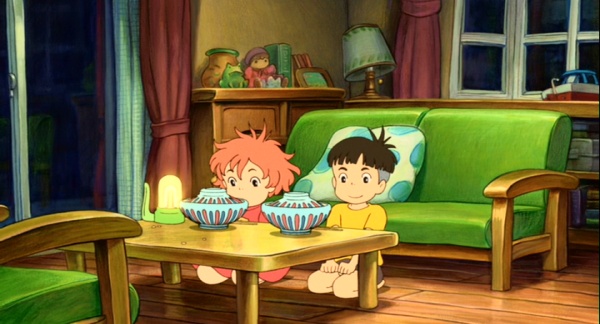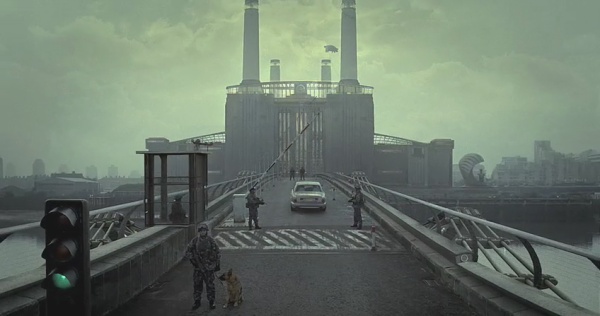Just For One Day
2010 // USA - UK // Matthew Vaughn // May 11, 2010 // Theatrical Print (AMC Esquire)
C - The high concept that undergirds Kick-Ass, while hardly a model of sparkling originality, at least holds the potential for a witty character piece or an intriguing flexing of generic norms. Colorless, clueless high school student and comic aficionado Dave Lizewski (Aaron Johnson) poses what he believes to be a fair question to his fellow geeks: Why has no one ever tried to be a real super hero? The answers seem obvious to Dave's pals. Super-powers don't actually, you know, exist, and even "regular guys" like Bruce Wayne are billionaires with access to science-fiction technology. Any real masked vigilante would end up in traction fairly quickly. Dave will not be deterred, however. Kick-Ass presents itself as a miserablist "What-If?" scenario about a scrawny kid donning a green wetsuit and attempting to fight crime. Unfortunately, the film lacks focus: at times it prefers the mode of a violent comic book played straight, or a limp high school farce, or a deadpan send-up of the superhero genre. Director Matthew Vaughn simply has no notion of where he wants to take this adaptation of Mark Millar and John Romita, Jr.'s comic, and the film's sporadic moments of droll inventiveness don't redeem its awkward muddling of its pedestrian components.
Clearly not having thought his plan through, Dave assumes that all one needs in order to be a superhero is a colorful costume and the will to stand up to evildoers. (One might call this a repurposing of Matt Yglasias' Green Lantern Theory of Geopolitics, which leads us to some kind of strange comic geekery / political blogging ouroboros.) There is a kind of guileless charm to Dave's naïvité, even if Johnson's performance is a clumsy blend of Tobey Maguire's Peter Parker, Cera/Eisenberg discomfiture, and the stammering nerd from a 1980s sex comedy. When Dave assumes his new superhero persona, Kick-Ass, Johnson's physical presence feels more vital, especially in the way his wide blue eyes and slack lips perfectly convey the dim adolescent dork behind the mask. His Travis Bickle mimicry in front of a mirror notwithstanding, Kick-Ass' cracked voice and self-conscious manner hint that Dave's wish-fulfillment will not end well. Indeed, the poor sap's first attempt to confront a pair of thugs lands him in the hospital, with deadened nerves and metal plates bolted to half his bones ("Just like Wolverine!" he enthuses.)
Meanwhile, the film introduces us to middle-aged widower Damon Macready (Nicolas Cage) and his eleven-year-old daughter, Mindy (Chloe Moretz). Like Dave, Damon and Mindy are in the masked vigilante game, but unlike Dave, they actually know what they're doing. Damon is a former hero cop framed by a New York City drug kingpin, now cutting a bloody swathe through the criminal underworld as Big Daddy, assisted by his lethal sidekick Hit Girl. Damon has trained Mindy relentlessly since the age of five to be a walking weapon of mass destruction, and while they are utterly devoted to one another, their father-daughter chats are on the relative merits of automatic pistols rather than the mean girls at school. It's heart-warming, in an utterly twisted and fucked-up kind of way, which I can only assume is one of the primary points of Millar and Romita's comic and, by extension, of Vaughn's film. Namely, that for all the paternal kindliness attributed to the hero-sidekick relationship, there's something more than a tad depraved about schooling a child to be a ruthless killer, especially when it's in the service of your own thirst for revenge.
By pure happenstance and a succession of misunderstandings, Kick-Ass eventually gets tangled up in Big Daddy and Hit Girl's scheme to topple drug lord Frank D'Amico (Mark Strong). Eventually, their efforts draw the attention of D'Amico's witless, slightly spoiled son Chris (Christopher Mintz-Plasse), who has superhero fantasies of his own. It's not worth elaborating on the story any further, because it isn't especially compelling on the whole, or even that thrilling or amusing in its moment-to-moment particulars. There's a subplot about a ridiculously gorgeous girl at school (Lyndsy Fonseca) who befriends Dave but—get this!—mistakenly thinks that he's gay. (Hilarity does not, in fact, ensue.) Vaughn's approach to the film's action is just tired and oddly disengaged, as though it's something he can't wait to get through. And I can't blame him. There's a clinical kind of fascination to the gore-spraying mayhem of Hit Girl's vigilante berserker rages, but the character-centered exchanges between Cage and Moretz are nonetheless far more engaging than the admittedly uncanny sight of a preteen murdering drug dealers with abandon. (Side note: For all of Cage's excesses as an actor, the deliberately bizarre cadence he adopts as Big Daddy is an inspired, genuinely funny flourish and a clever dig at Christian Bale's Batman rasp.)
There's an admittedly cunning little fake-out at the heart of Kick-Ass, in that Vaughn tricks us into believing that his tale is primary about the titular character. Dave's simple character arc from oblivious optimism to disillusionment and back to seasoned optimism occupies much of the film's rather tight thematic space, but narratively speaking, Kick-Ass is actually about Hit Girl. Vaughn is plainly trying to be edgy by centering his plot on a foul-mouthed, bloodthirsty eleven-year-old girl, and the film's probings at comic book conventions aren't entirely off-the-mark. Yet the whole enterprise smacks of trying to have it both ways, of critiquing such conventions as grotesque while also reveling in their sheer awesomeness. Contradiction isn't necessarily a defeating quality for a film. Snyder's underrated Watchmen had its share of problems regarding the simultaneous celebration and revilement of superhero violence, and still managed to be a contemplative and gloriously messy fantasy. Tarantino's superlative Inglourious Basterds was an exquisite snarl of mixed messages, and it even pulled a similar trick, vis-à -vis the gender of its "real" protagonist. However, Vaughn isn't up to the task of juggling his scold and fanboy sides with anything approaching Tarantino's agility, or even achieving Snyder's giddy attention to detail. Kick-Ass simply isn't good enough to accommodate everything that the film-maker wants to achieve. Brutal, bloody violence (borderline torture, really) sits uncomfortably alongside fantastical, bullet-spraying action that bears no resemblance to reality. The casual dismissal of superhero stories as juvenile silliness bumps up against copious gadgetry techno-babble and flamboyant sets. Shoehorning these elements together doesn't make a film complex when it's done so gracelessly, or with so little regard for the coherent whole.














